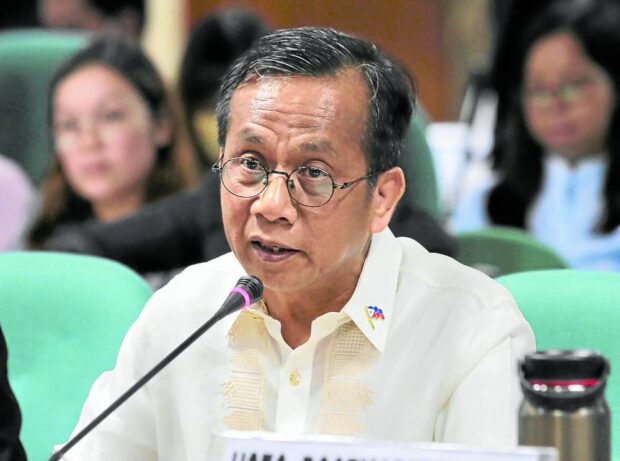
Socioeconomic Planning Secretary Arsenio Balisacan (File photo from the Senate Public Relations and Information Bureau)
MANILA, Philippines — Socioeconomic Planning Secretary Arsenio Balisacan on Saturday reiterated his “strong support for proposed amendments to the restrictive economic provisions of our Constitution,” even as he clarified that he did not use the word “discord” in describing the dispute between the Senate and the House of Representatives over ways to amend the charter.
Balisacan, the director general of the National Economic and Development Authority (Neda), was referring to the Inquirer headline on Saturday, “Cha-cha discord can turn off investors–Neda chief.”
“I would like to categorically state that I have never used the word ‘discord’ in my statements,” he said in a statement on Saturday.
In remarks he made during a press briefing on Friday on the ongoing campaign to gather signatures for a petition for a people’s initiative to amend the Constitution, Balisacan called on lawmakers to agree on a common position on Charter change (Cha-cha).
“I hope they can agree very soon. Because we don’t want that uncertainty. One of the factors that inhibit investments, whether domestic or foreign, is a state of uncertainty,” he said.
This was when he was asked to comment on the disagreement between senators and House members over the mode of changing the Charter.
‘Fertile ground’
“We hope that our leaders will come to a common position quickly so that we can move on,” Balisacan said.
“Amendments removing the restrictive economic provisions will provide a more fertile ground for both local and foreign investments, thereby fostering greater economic growth and development,” he said in his statement on Saturday.
The ongoing people’s initiative, however, is seeking to amend a Charter provision that will mandate a joint vote by all members of Congress on future amendments to the Constitution.
The 24 senators strongly oppose this, saying that if the amendment passes, they would be emasculated by the overwhelming number of over 300 House members in a vote.
Although many of the senators see the need for some tweaks in at least three economic provisions of the Constitution pertaining to foreign participation in the economy, they could not agree with the House on the manner that these would be done.
“It is necessary to address and remove these [Constitutional] restrictions, but it is also important to note that apart from eliminating those barriers, it is imperative to address the ease of doing business, high-cost of certain inputs like energy, and the predictability of our policies, regulatory or otherwise,” Balisacan said on Saturday.
Full benefits
“There are several policy reforms needed to get the full benefits of removing the economic restrictions in the constitution.”
The Neda chief commended the Senate and the House for their efforts to address the needed amendments.
“I believe that these discussions are being conducted with the nation’s best interests in mind and with a shared goal of economic progress and stability,” he said.
“It is crucial to highlight that, while supportive of these amendments, I also advocate for a balanced approach. This includes maintaining certain protections, such as the stance against full foreign ownership of land, as articulated by President Marcos,” he added.
The faster, the better
According to Albay Rep. Joey Salceda, the faster the Congress completes Cha-cha, “the better it will be for the economy.”
“Investor certainty is a function of legislative speed. The shorter the debates take, the more certain investors become,” Salceda said on Saturday. “But in the House framework—there is no investor uncertainty. If anything, there is cause for investor optimism.”
Salceda was referring to Resolution of Both Houses No. 2, which was passed in 2021 to relax certain economic provisions in the Charter, which he has previously argued was better because it will also reassess restrictions on foreign ownership of land.
The Senate’s RBH No. 6 only focuses on provisions to ease restrictions on foreign participation in public utilities, educational institutions and the advertising industry.
“Unlike other reforms where there is a rationalization of existing incentives or benefits, this one will not take away any existing investor rights and privileges. This will expand them,” Salceda said.
“They can invest in more places and more sectors, infuse more capital, and hire more Filipinos,” he added.